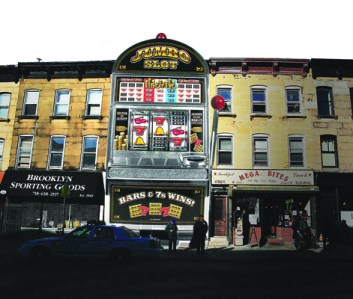Place Your Bets: Real Estate and Gaming Companies Jockey for Position
By Daniel Edward Rosen June 26, 2012 1:00 pm
reprintsOne would assume that owning two racinos would result in handsome profits for Jeffrey Gural.
Yet despite reports that the racino at the Aqueduct Racetrack in Queens made $57.5 million in May, outpacing Mohegan Sun as the country’s top slot-machine moneymaker, the Newmark Grubb Knight Frank chairman’s investment in Tioga Downs and Vernon Downs has not been so lucrative, in part because of unfavorable locations and a high tax rate.
 “One problem I have is one racino is five miles away from an Indian casino that has table games—that was a terrible decision,” Mr. Gural said late last week. “My other racino is in Tioga County in a town of 1,000 people. Obviously, if you have a great location like Aqueduct and Yonkers, you’d make a lot of money. But the bulk of the money is going into state taxes.”
“One problem I have is one racino is five miles away from an Indian casino that has table games—that was a terrible decision,” Mr. Gural said late last week. “My other racino is in Tioga County in a town of 1,000 people. Obviously, if you have a great location like Aqueduct and Yonkers, you’d make a lot of money. But the bulk of the money is going into state taxes.”
And, in fact, for would-be gaming operators in this town, it’s all about location, location, location. While some have speculated that New York City—specifically, Queens—will be one of up to seven sites chosen by legislators across the state two years from now, others have predicted that most, if not all, the sites will likely be upstate and in the Catskills.
For the time being, however, none of that matters. Now that Gov. Andrew Cuomo has whetted the appetites of in-state racino operators and big-time out-of-state casino operators, both groups are quietly lobbying local politicians and developers for a piece of the action should Governor Cuomo continue to support legalized table gambling in the Empire State.
The prospect alone has drawn several big-name suitors: MGM, Wynn Resorts, Caesars, Boyd Gaming Company and Sands have all kicked the tires, some of them going so far as to hire notable lobbying firms like Kasirer Consulting, LJM Rad and Bolton-St. Johns.
But many obstacles stand in the way of New York becoming Sin City East. Earlier this year, legislators approved a bipartisan constitutional amendment allowing up to seven privately owned casinos to have table gaming, including roulette and poker. But before gambling can be legalized, elected officials in the Senate and Assembly must also authorize a second legislative vote before the measure can be brought before voters on a statewide ballot in November 2013.



